2014 年北京科技大学基础英语考研真题
北 京 科 技 大 学
2014 年硕士学位研究生入学考试试题
==============================================================================
试题编号:618 试题名称: 基础英语
适用专业:
外国语言文学
说明: 所有答案必须写在答题纸上,做在试题或草稿纸上无效;请用蓝色或黑色钢笔或签
字笔答题。
==============================================================================
Part Ⅰ Vocabulary (30 minutes, 30 points, 1 point each)
Section A
Directions:Therearefifteenincompletesentencesinthissection.Foreachsentence
therearefourchoicesmarkedA,B,CandD.ChoosetheONEthatbestcompletesthe
sentence.
B. complete
C. disperse
D. descend
C. paraded
D. revealed
B. gone in for
C. gone with
B. had ever been
C. has ever been
D. would ever be
D. gone through with
1. Whatever the causes, English is more widely spoken and written than any other
language_____________.
A. ever was
2. He has _____________ strange hobbies like collecting bottle tops and inventing
secret codes.
A. gone on
3. The captured criminals were _____________ in chains through the streets.
A. exhibited
4. The ceremony will _____________ as soon as the minister arrives.
A. commence
5. Being a pop star can be quite a hard life, with a lot of travelling _____________
heavy schedules.
D. with regard to
A. owing to
6. The old building is in a good state of _____________ except for the wooden floors.
A. preservation
7. The city has decided to _____________ smoking.
A. do away with
8. _____________ of the two books holds the opinion that the danger of nuclear war
is increasing.
A. None
9. Louis was asked to _____________ the man who stole her purse.
A. confirm
10. The bus that_____________ outside the inn would soon take the visitors downtown.
A. held back
C. in relation to
C. get away with
D. put away
B. observation
C. conservation
D. compensation
B. pulled up
C. set forth
D. got down
B. recognize
C. claim
B. take away
B. Both
C. Most
D. Neither
B. displayed
B. as to
D. identify
�
D. up
C. than
B. beyond
B. take over
11. Last year, these ships transported a total of 83.34 million tons of cargo, a
4 percent increase_____________ the previous year.
A. over
12. My son doesn’t know what to _____________at the university; he can’t make up
his mind about his future.
A. take up
13.Criticism and self-criticism is necessary_____________ it helps us to find and
correct our mistakes.
A. at that
14. I regret_____________the work unfinished; I should have planned everything ahead
carefully.
A. left
D. have left
15. How I wish John recognized the fact that he _____________ in the wrong.
A. is always nearly
always
C. is nearly always
B. always is nearly
D. take after
D. nearly is
B. to leave
B. by that
C. take in
C. in that
D. on that
C. leaving
Section B
Directions:Therearetensentencesinthissectionwithonewordorphraseunderlined
in each sentence. From the four choices given, choose one that best explains or
defines the underlined part in each sentence.
B. hostility
C. illusion
D. rampancy
B. agitation
D. despotism
C. resistance
B. discrepancy
D. complete agreement
16.Most Americans were unaware of the advent of the Nuclear Age until the news of
Hiroshima reached them.
A. arrival
17. We were surprised by the unanimity with which our proposals were accepted by
different groups.
A. sympathy
18.We must learn to meet adversity gracefully.
A. misfortune
19.A shred investor, he took clever advantage of the fluctuation of the stock market.
A. bad-tempered
20.The criminal’s fatal blunder led to his capture.
A. weakness
21. I am afraid that my parents will reprimand me when I show them my report card.
A. discourage
22. He had worked in the hospital for so many years that he was callous to the
suffering in the wards.
A. sympathetic
23. Seldom have I seen food and drink served in such profusion as at the wedding
feast.
A. lavishness
24. The deft waiter uncorked the champagne without spilling a drop.
A. adept
D. awkward
25. I don’t know whether it is better to be ignorant of a subject or to have a mere
D. misunderstand
D. extravagance
B. inadequacy
C. impressive
C. competent
D. adaptable
C. humiliate
C. heartless
D. sensitive
C. diversity
B. error
C. taboo
D. instinct
B. handsome
C. calamity
B. illicit
B. reprove
B. obliging
�
smattering of information about it.
A. ignorance
B. slight knowledge
C. appreciation D. evaluation
B. complimented… foreseeable
D. decried... unexceptionable
Section C
Directions:Each of the following five sentences below has two blanks, each blank
indicatingthatsomethinghasbeenomitted.Beneaththesentencearefourlettered
setsofwords.Choosethesetofwordsfortheblanksthatbestfitthemeaningof
the sentence.
26. Although some of her fellow scientists________ the unorthodox laboratory
methodology that others found innovative, unanimous praise greeted her experimental
results: at once pioneering and
A. ignored… untrustworthy
C. welcomed… mundane
27. Although Harry, Stack Sullivan is one of the most influential social scientists
of this century, his ideas are now so ________ in our society that they seem almost
________.
A. novel… antiquated
C. commonplace ... banal
28. Her first concert appearance was disappointingly perfunctory and derivative,
rather than the________ performance in the ________style we had anticipated.
A. talented… tenuous
C. artistic... mechanical
29.Their mutual teasing seemed________, but in fact it ________a long-standing
hostility.
A. aimless...produced
C. playful...contravened
30. Having sufficient income of her own constituted for Alice________independence
that made possible a degree of________ in her emotional life as well.
A. a material… security
C. a financial... economy
B. a profound... conformity
D. a psychological... extravagance
B. revolutionary… fundamental
D. disputed...esoteric
B. friendly...masked
D. bitter...revealed
________.
B. prosaic...classic
D. inspired… innovative
Part Ⅱ Proofreading and error correction (20 minutes, 20 points, 2 points each)
Directions: ThefollowingpassagecontainsTENerrors.Eachindicatedlinecontains
amaximumofONEerror.Ineachcase,onlyONEwordisinvolved.Youshouldproof-read
the passage and correct it in the following way.
For a wrong word,
underline the wrong word and write the correct one in
For a missing word,
For an unnecessary word,
the blank provided at the end of the line.
mark the position of the missing word with a “∧”
sign and write the word you believe to be missing in the
blank provided at the end of the line.
cross out the unnecessary word with a slash “/” and
put the word in the blank provided at the end of the line.
Example
When∧art museum wants a new exhibit,
1.
an
�
it never buys things in finished form and hangs
them on the wall. When a natural history museum
wants an exhibition, it must often build it.
exhibit
2.
never
3.
1 ______
When you start talking about good and bad manners, you
immediately start meeting difficulties. Many people just cannot
agree what they mean. We asked a lady, who replied that she
thought you could tell a well-mannered person on the
way they occupied the space around them. For example, when such a
person walks down a street, he or she is constantly unaware of others.
______
Such people never bump into other people. However, a second
person thought that this was more a question of civilized
behavior as good manners. Instead, this other person told us a story,
______
it he said was quite well-known, about an American who had been invited
to an Arab meal at one of the countries of the Middle East. The American
hasn’t been told very much about the kind of food he might expect. If he had
______
known about American food, he might have behaved better.
Immediately before him was a very flat piece of bread that
looked, to him, very much as a napkin. Picking it up, he put it into his collar,
8 _____
so that it falls across his shirt. His Arab host, who had been watching, said
_____
of nothing, but immediately copied the action of his guest
_____
And that, said this second person, was a fine example of good manners.
4 ______
5______
6
7______
2
3
9
10
Part III Reading Comprehension (50 minutes, 40 points, 2 points each)
Directions:There are four passages in this part. Read each passage carefully and
answer the questions following each passage as you are required.
Passage One
In the developed countries, the dominant factor in the next society will be
something to which most people are only just beginning to pay attention: the rapid
growth in the older population and the rapid shrinking of the younger generation.
Politicians everywhere still promise to save the existing pension system, but
they—and their constituents—know perfectly well that in another 25 years people
will have to keep working until their mid-70s, health permitting.
What has not yet sunk in is that a growing number of older people—say those
over 50—will not keep on working as traditional full-time nine-to-five employees,
but will participate in the labor force in many new and different ways: as temporaries,
�
as part-timers, as consultants, on special assignments and so on. What used to be
personnel and are now known as human resources departments still assume that those
who work for an organization are full-time employees. Employment laws and
regulations are based on the same assumption. Within 20 or 25 years, however, perhaps
as many as half the people who work for an organization will not be employed by it,
certainly not on a full-time basis. This will be especially true for older people.
New ways of working with people at arm’s length will increasingly become the central
managerial issue of employing organizations, and not just of businesses.
The shrinking of the younger population will cause an even greater upheaval,
if only because nothing like this has happened since the dying centuries of the Roman
Empire. In every single developed country, but also in China and Brazil, the birth
rate is now well below the replacement rate of 2.2 live births per woman of
reproductive age. Politically, this means that immigration will become an
important—and highly divisive—issue in all rich countries. It will cut across all
traditional political alignments. Economically, the decline in the young population
will change markets in fundamental ways. Growth in family formation has been the
driving force of all domestic markets in the developed world, but the rate of family
formation is certain to fall steadily unless bolstered by large-scale immigration
of younger people. The homogeneous mass market that emerged in all rich countries
after the Second World War has been youth-determined from the start. It will now
become middle-age-determined, or perhaps more likely it will split into two: a
middle-age-determined mass market and a much smaller youth-determined one. And
because the supply of young people will shrink, creating new employment patterns
to attract and hold the growing number of older people (especially older educated
people) will become increasingly important.
1. The passage is mainly about______.
A. theinfluence of aging problem
B. the shrinking of younger population
C. thechanging of working style
D. thechange of consuming pattern
2. From the passage, we learn people will have to keep working until their mid-70s
because of ______.
A. overallimprovement of people’s health condition
B. oldpeople’s high qualification
C. the lack of young employee
D. the great need for more employees by new economy
3. According to the author, what is TRUE about the situation in 20 or 25 years?
A. There will be stricter laws and regulations on employment.
B. There will be fewer people who take full-time jobs.
C. There will be more olderemployees.
D. There will be more people who work at home and far from each other.
4. What does the word “upheaval” (Para.3, Line 1) most probably mean?
A. greatachievement
B. illinfluence
�
C. goodeffect
D. great change
5. Theinfluence that the reduction of young people has on economy may include the
following BUT______.
A. the appearing of mass market centering the young
B. the shift of the market center from the young to the middle-aged
C. the shrinking of the population who gets to form family
D. thetendency for the market to split into two ones
Passage Two
In general, our society is becoming one of giant enterprises directed by a
bureaucratic management in which man becomes a small, well-oiled cog in the machinery.
The oiling is done with higher wages, well-ventilated factories and piped music,
and by psychologists and “human-relations” experts; yet all this oiling does not
alter the fact that man has become powerless, that he does not wholeheartedly
participate in his work and that he is bored with it. In fact, the blue- and the
white-collar workers have become economic puppets who dance to the tune of automated
machines and bureaucratic management.
The worker and employee are anxious, not only because they might find themselves
out of a job; they are anxious also because they are unable to acquire any real
satisfaction or interest in life. They live and die without ever having confronted
the fundamental realities of human existence as emotionally and intellectually
independent and productive human beings.
Those higher up on the social ladder are no less anxious. Their lives are no
less empty than those of their subordinates. They are even more insecure in some
respects. They are in a highly competitive race. To be promoted or to fall behind
is not a matter of salary but even more a matter of self-respect. When they apply
for their first job, they are tested for intelligence as well as for the tight mixture
of submissiveness and independence. From that moment on they are tested again and
again-by the psychologists, for whom testing is a big business, and by their
superiors, who judge their behavior, sociability, capacity to get along, etc. This
constant need to prove that one is as good as or better than one’ s fellow-competitor
creates constant anxiety and stress, the very causes of unhappiness and illness.
Am I suggesting that we should return to the preindustrial mode of production
or to nineteenth century “free enterprise” capitalism? Certainly not. Problems
are never solved by returning to a stage which one has already outgrown. I suggest
transforming our social system from a bureaucratically managed industrialism in
which maximal production and consumption are ends in themselves into a humanist
industrialism in which man and full development of his potentialities — those of
love and of reason— are the aims of all social arrangements. Production and
consumption should serve only as means to this end, and should be prevented from
ruling man.
6. By “a well-oiled cog in the machinery” the author intends to render the idea
�
that man is______.
A. a necessary part of the society though each individual’s function is negligible
B. working in complete harmony with the rest of the society
C. an unimportant part in comparison with the rest of the society, though functioning
smoothly
D. a humble component of the society, especially when working smoothly
7 . The real cause of the anxiety of the workers and employees is that______.
A. they are likely to lose their jobs
B. they have no genuine satisfaction or interest in life
C. they are faced with the fundamental realities of human existence
D. they are afraid of competition
8. From the passage we can infer that real happiness of life belongs to those______.
A. who are at the bottom of the society
B. who are higher up in their social status
C. who prove better than their fellow-competitors
D. who could keep far away from this competitive world
9. To solve the present social problems the author suggests that we should______.
A. resort to the production mode of our ancestors
B. offer higher wages to the workers and employees
C. enable man to fully develop his potentialities
D. take the fundamental realities for granted
10. The author’s attitude towards industrialism might best be summarized as one
of______.
A. approval
B. disapproval
C. suspicion
D. tolerance
Passage Three
The next society will be a knowledge society. Knowledge will be its key resource,
and knowledge workers will be the dominant group in its workforce. Its three main
characteristics will be:
Borderlessness, because knowledge travels even more effortlessly than money.
Upward mobility, available to everyone through easily acquired formal education.
The potential for failure as well as success.
Anyone can acquire the “means of production”, i.e., the knowledge required for
the job, but not everyone can win.
Together, those three characteristics will make the knowledge society a highly
competitive one, for organizations and individuals alike. Information technology,
although only one of many new features of the next society, is already having one
hugely important effect: it is allowing knowledge to spread near-instantly, and
making it accessible to everyone. Given the ease and speed at which information
travels, every institution in the knowledge society—not only businesses, but also
schools, universities, hospitals and increasingly government agencies too—has to
be globally competitive, even though most organizations will continue to be local
in their activities and in their markets. This is because the Internet will keep
customers everywhere informed on what is available anywhere in the world, and at
�
what price.
This new knowledge economy will rely heavily on knowledge workers. At present,
this term is widely used to describe people with considerable theoretical knowledge
and learning: doctors, lawyers, teachers, accountants, and chemical engineers. But
the most striking growth will be in “knowledge technologists”: computer
technicians, software designers, analysts in clinical labs, manufacturing
technologists, and paralegals. These people are as much manual workers as they are
knowledge workers; in fact, they usually spend far more time working with their hands
than with their brains. But their manual work is based on a substantial amount of
theoretical knowledge which can be acquired only through formal education, not
through an apprenticeship. They are not, as a rule, much better paid than traditional
skilled workers, but they see themselves as “professionals”. Just as unskilled
manual workers in manufacturing were the dominant social and political force in the
20th century, knowledge technologists are likely to become the dominant social—and
perhaps also political—force over the next decades.
11. According to the author, knowledge can be defined as______.
A.understanding of the outside world
B.productive resources
C.experiences acquired in the course of production
D.something for entertainment
12. Among the following, which does NOT contribute to the competitiveness of the
new society?
A.a vaguer borderline
B.great flexibility
C.high risk of failure and success
D.more high-qualified workers
13. Which of the following statements is NOT true about Internet?
A. It will speed up the spreading of knowledge.
B. It will bring great convenience to customers in buying something.
C. It will enhance global competition.
D. It will push companies to expand their activities abroad.
14. It can be learnt that the most striking difference between present knowledge
workers and future knowledge workers is that______.
A.the latter tends to combine theoretical knowledge with manual skills
B.the former tends to be more professional
C.the latter tends to spend more time at work than at school
D.the former tends to accept more school education than the latter
15. It can be inferred that the future knowledge workers view themselves as
professionals because ______.
A.they can make more money than manual workers
B.they are free from manual work
C.they are better-educated
D.they are more highly-respected
�
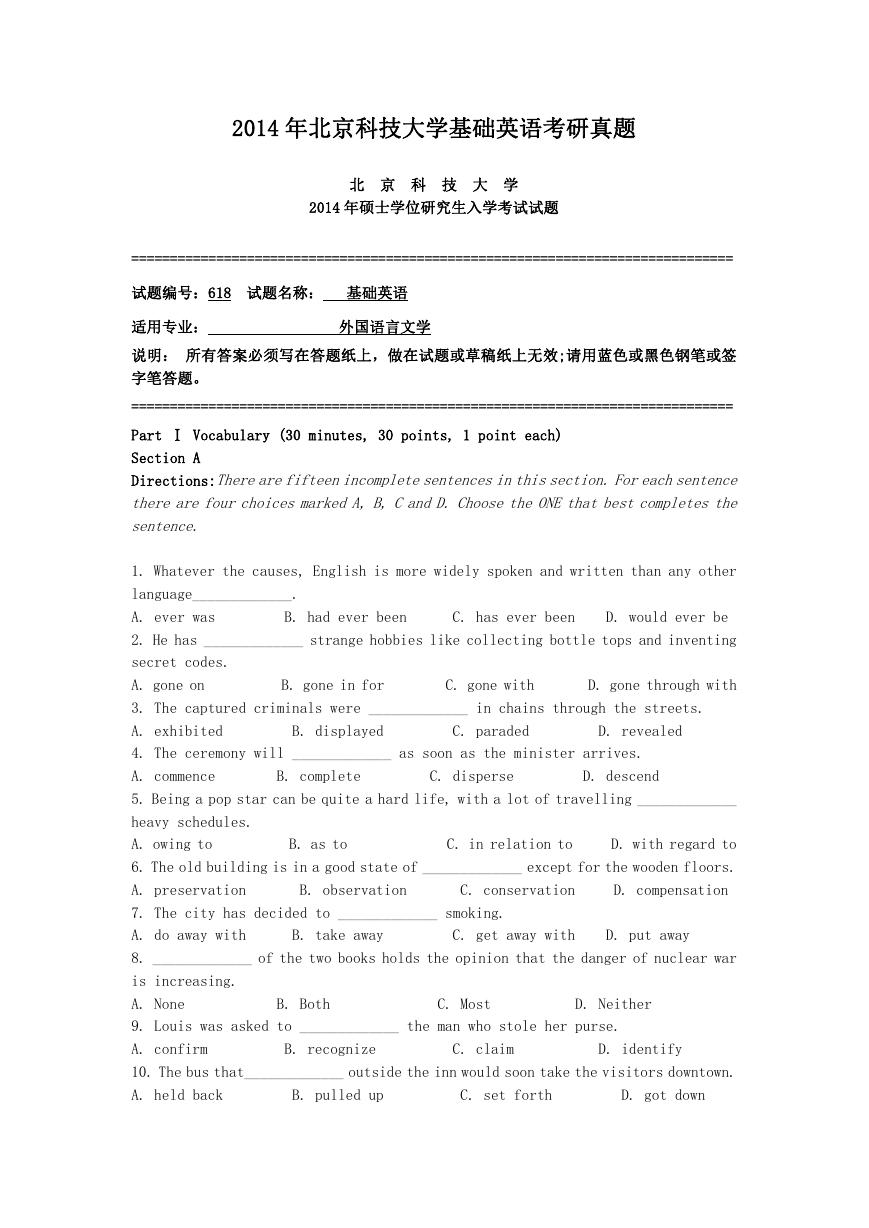
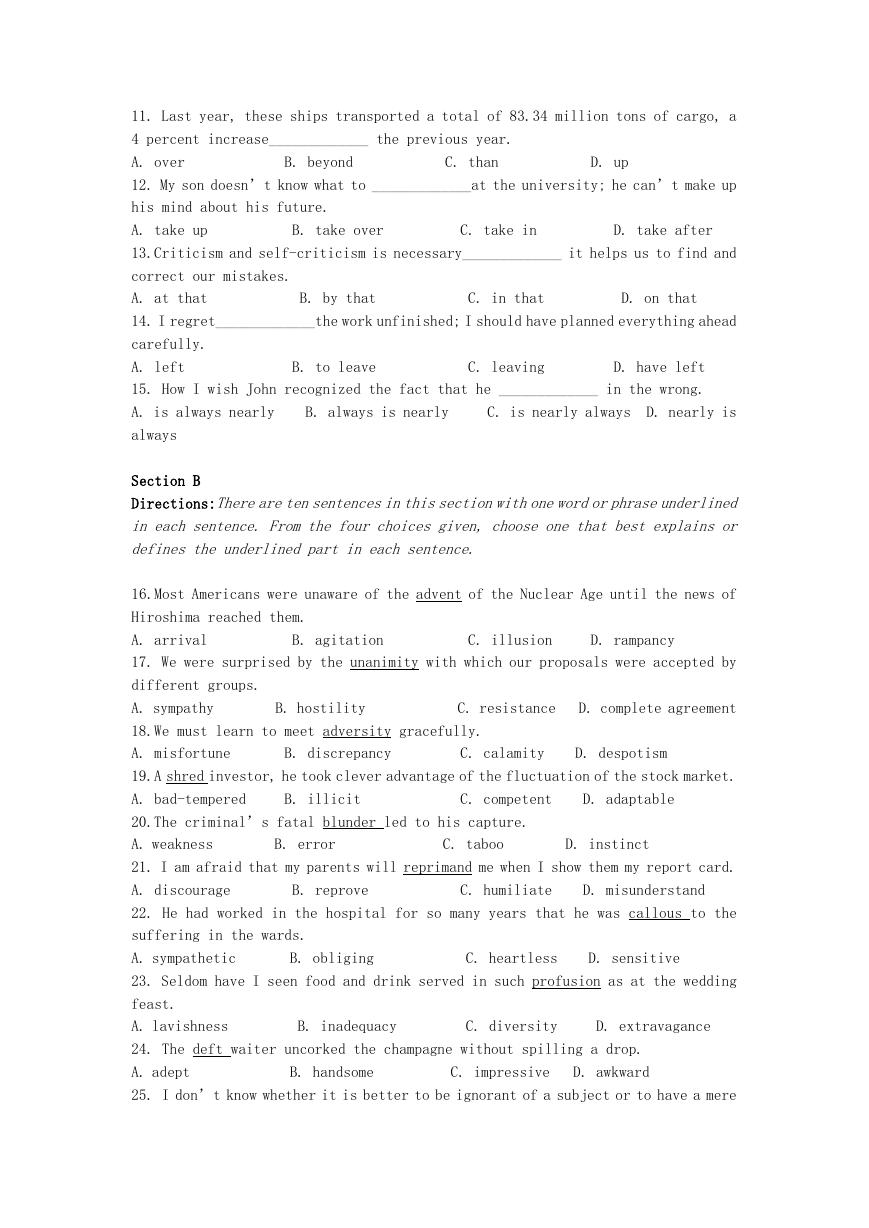

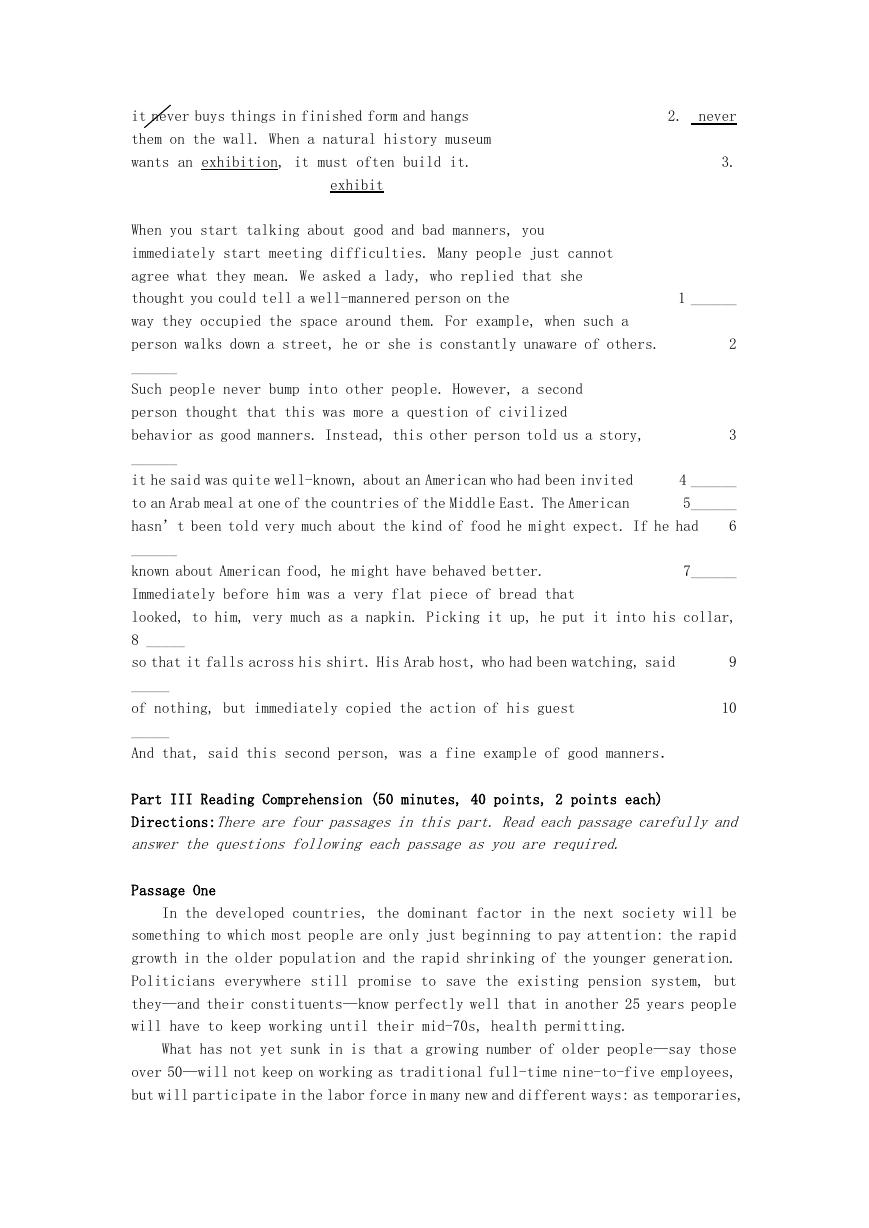
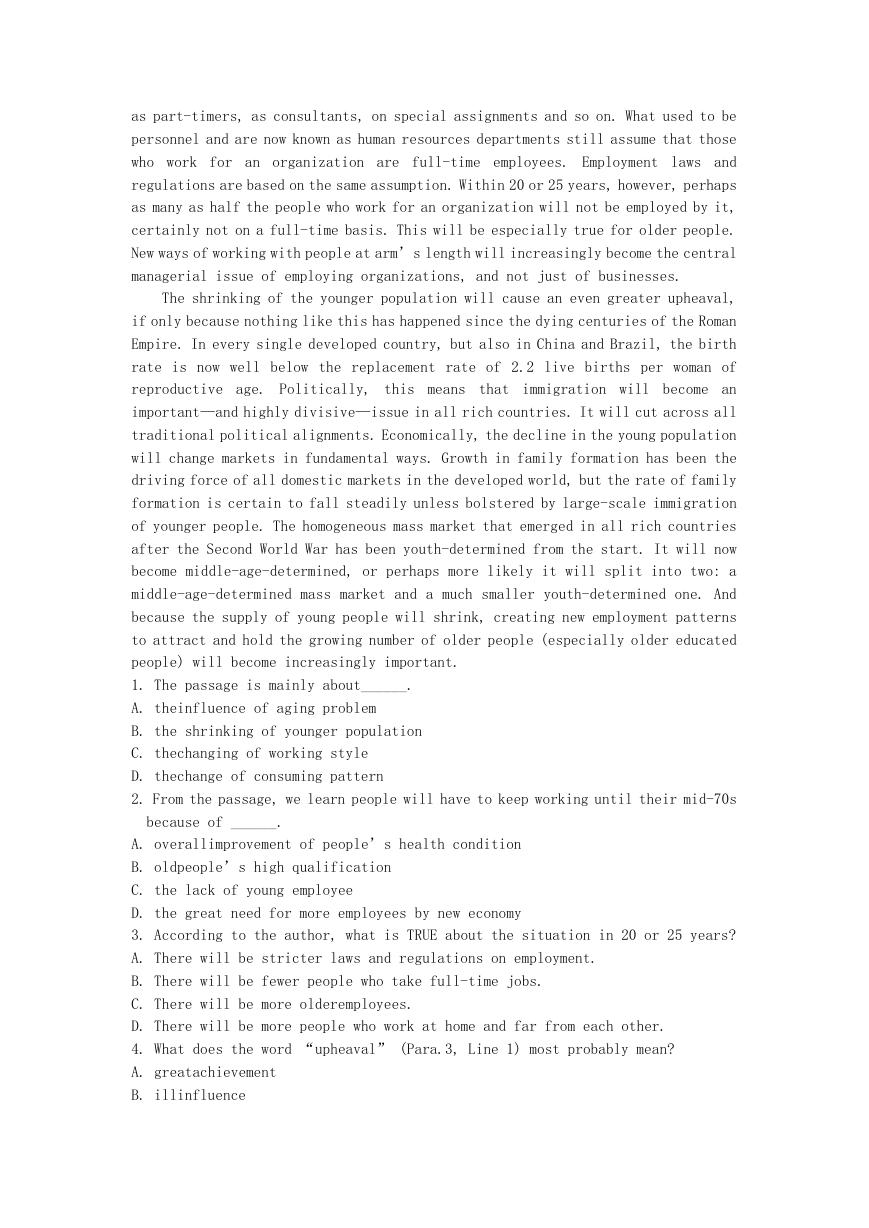
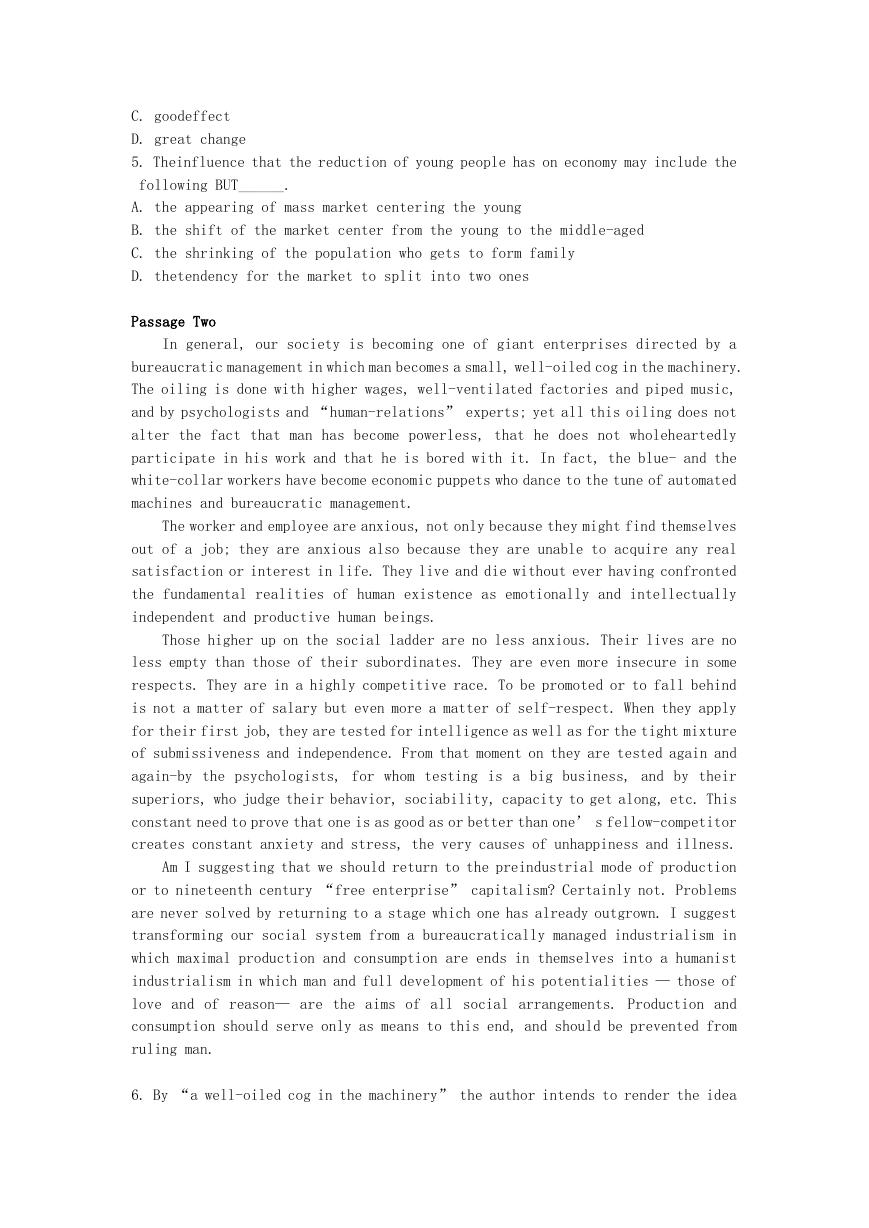
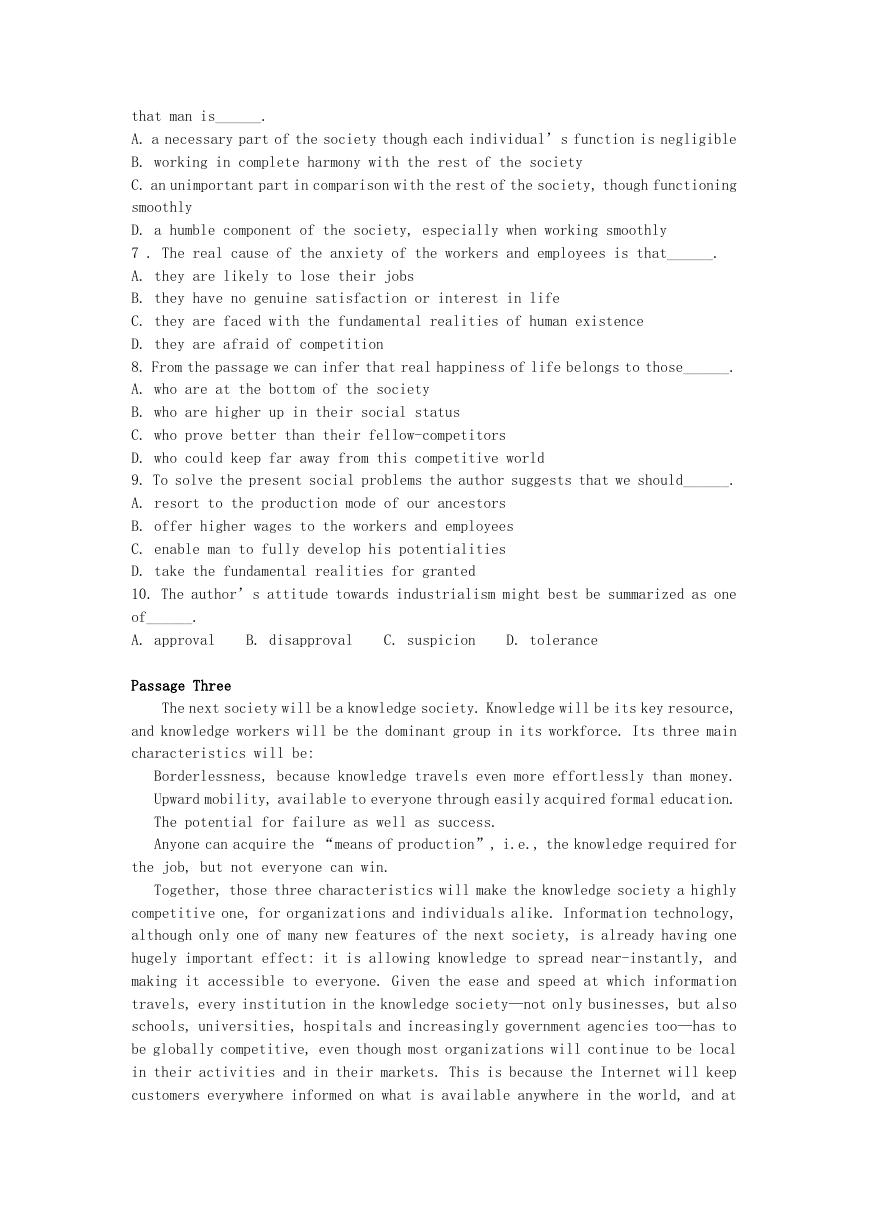
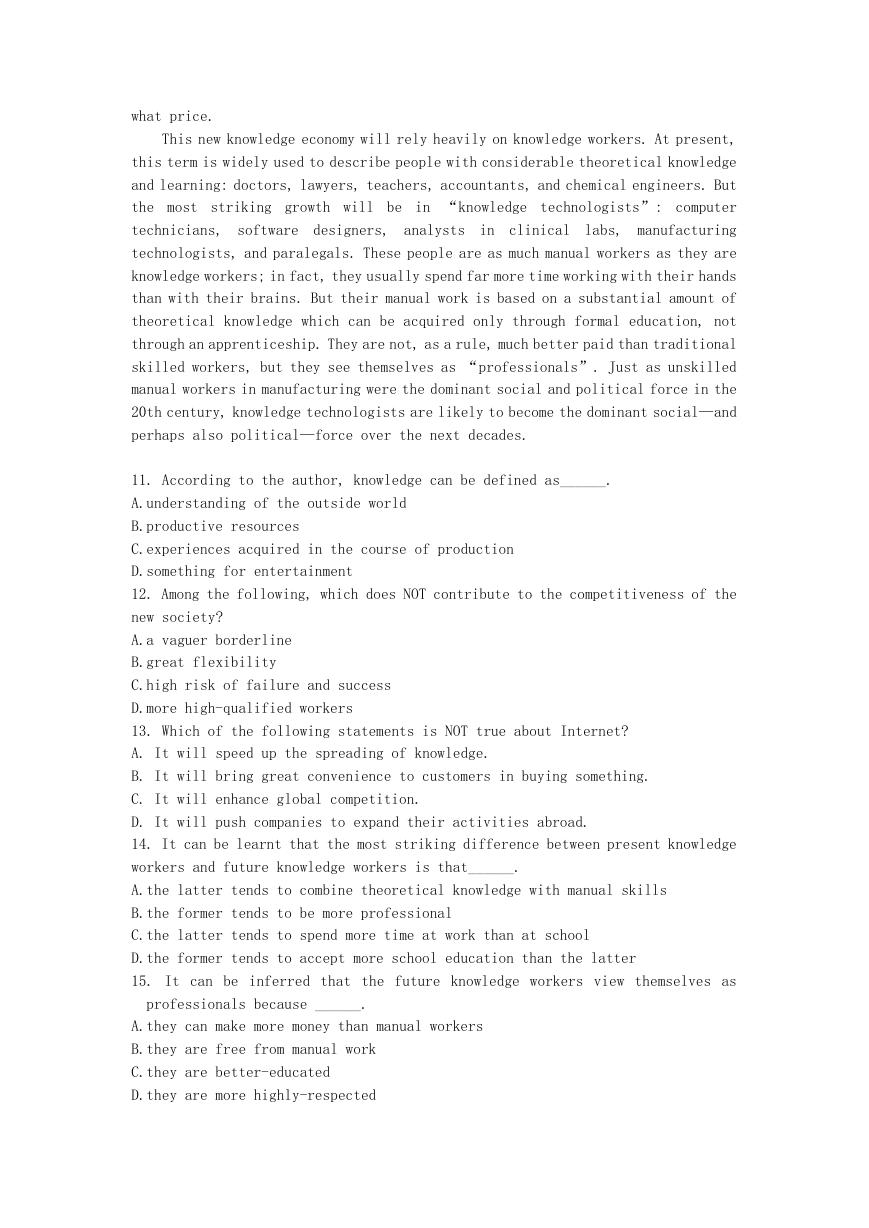








 2023年江西萍乡中考道德与法治真题及答案.doc
2023年江西萍乡中考道德与法治真题及答案.doc 2012年重庆南川中考生物真题及答案.doc
2012年重庆南川中考生物真题及答案.doc 2013年江西师范大学地理学综合及文艺理论基础考研真题.doc
2013年江西师范大学地理学综合及文艺理论基础考研真题.doc 2020年四川甘孜小升初语文真题及答案I卷.doc
2020年四川甘孜小升初语文真题及答案I卷.doc 2020年注册岩土工程师专业基础考试真题及答案.doc
2020年注册岩土工程师专业基础考试真题及答案.doc 2023-2024学年福建省厦门市九年级上学期数学月考试题及答案.doc
2023-2024学年福建省厦门市九年级上学期数学月考试题及答案.doc 2021-2022学年辽宁省沈阳市大东区九年级上学期语文期末试题及答案.doc
2021-2022学年辽宁省沈阳市大东区九年级上学期语文期末试题及答案.doc 2022-2023学年北京东城区初三第一学期物理期末试卷及答案.doc
2022-2023学年北京东城区初三第一学期物理期末试卷及答案.doc 2018上半年江西教师资格初中地理学科知识与教学能力真题及答案.doc
2018上半年江西教师资格初中地理学科知识与教学能力真题及答案.doc 2012年河北国家公务员申论考试真题及答案-省级.doc
2012年河北国家公务员申论考试真题及答案-省级.doc 2020-2021学年江苏省扬州市江都区邵樊片九年级上学期数学第一次质量检测试题及答案.doc
2020-2021学年江苏省扬州市江都区邵樊片九年级上学期数学第一次质量检测试题及答案.doc 2022下半年黑龙江教师资格证中学综合素质真题及答案.doc
2022下半年黑龙江教师资格证中学综合素质真题及答案.doc